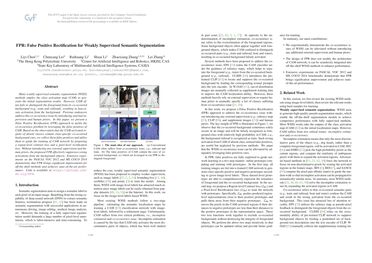FPR: False Positive Rectification for Weakly Supervised Semantic Segmentation
Many weakly supervised semantic segmentation (WSSS) methods employ the class activation map (CAM) to generate the initial segmentation results. However, CAM often fails to distinguish the foreground from its co-occurred background (e.g., train and railroad), resulting in inaccurate activation from the background. Previous endeavors address this co-occurrence issue by introducing external supervision and human priors. In this paper, we present a False Positive Rectification (FPR) approach to tackle the co-occurrence problem by leveraging the false positives of CAM. Based on the observation that the CAM-activated regions of absent classes contain class-specific co-occurred background cues, we collect these false positives and utilize them to guide the training of CAM network by proposing a region-level contrast loss and a pixel-level rectification loss. Without introducing any external supervision and human priors, the proposed FPR effectively suppresses wrong activations from the background objects. Extensive experiments on the PASCAL VOC 2012 and MS COCO 2014 demonstrate that FPR brings significant improvements for off-the-shelf methods and achieves state-of-the-art performance. Code is available at https://github.com/mt-cly/FPR.
PDF Abstract




 MS COCO
MS COCO